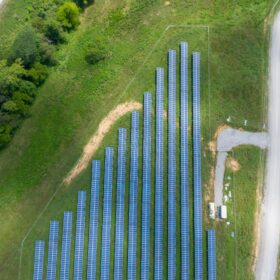Gov. Ron DeSantis enacted a new law to make it faster and easier for residents to go solar in the Sunshine State.
The legislation was rolled into a construction reform package, with key provisions including the allowance of private providers, virtual inspections and automated permitting platforms. The act also forbids local government departments from requiring certain documents that are deemed unnecessary and create bottlenecks.
For rooftop solar and other single-trade projects, local governments have five days to review and approve permit applications under the new law. If the local government official misses the deadline, the permit application “must be deemed approved as a matter of law, and the permit must be issued by the local building official on the next business day,” the newly enacted law says.
Florida’s legislation is a bit different than most of the automated permitting bills introduced across the country this session, nearly all of which failed to pass. Instead of mandating municipalities to use automated permitting software, the new policy works within Florida’s existing framework by allowing licensed private inspection providers to conduct plan review and inspections for home solar installations and other single-trade projects.
The legislation not only allows private providers conduct inspections, but it allows the providers to do virtual inspections and to use automated permitting software, such as SolarAPP+, a free platform developed by the National Renewable Energy Laboratory.
Private providers who use the software must then submit an affidavit to the department certifying they hold the appropriate license for reviewing the project’s plan the plans apply with the applicable code.
The law also authorizes virtual inspections and requires local building departments to adjust their permitting fees when services aren’t provided by the municipality.
The law authorizes private providers to approve building plans and perform building code inspections, so long as the inspection and plan approval are within the scope of their license.
Private providers are also now authorized (but not required) to use certain automated or other software-based plan review systems made for determining National Electrical Code, Florida Building Code and other code-related compliance.
The law also prohibits local governments from requiring copies of contracts or other related documents, such as labor costs and letters of intent, to issue permits. According to Energy Sage, requirements for these documents are one of the biggest administrative bottlenecks in solar permitting.
The bill sailed through the Legislature’s House and Senate, unanimously passing in both the House and the Senate.
Bills to remove permitting bottlenecks began popping up across the country this year, but most fell flat. Solar permitting bills failed to pass in Minnesota, Hawaii, New York and Illinois. Colorado technically passed a bill that, as introduced, would have required automated permitting, but the state’s House of Representatives gutted the bulk of the bill.
New Jersey, however, successfully passed a bill for a smart solar permitting platform. Texas passed a bill that aims to fast-track residential solar and storage installations. California adopted SolarAPP+ last year, with Maryland following suit later that year (while Maryland’s mandate for automated solar permitting does not specifically require SolarAPP+, the state incentivizes its adoption through grants).
Florida’s permitting delays can fluctuate from place to place, according to Environment America. In Orange County, for example, permits are typically approved in 24 hours and have a nominal electrical fee. However, in Duval County, permits can take more than 30 days with up to a $500 fee.
Across the United States, 22% of projects that apply for permits are canceled, most commonly due to permitting delays, according to the Environment Illinois Research & Education Center and the Illinois PIRG Education Fund.
Florida has one of the most robust residential solar markets in the country. With 4.58% of the Sunshine State’s homes having solar, Florida’s residential solar is ranked 2nd for its solar capacity and 3rd per capita, according to Solar Energy Industries Association. According to Environment America, much is this growth has been bolstered by no state sales tax on equipment purchases, 1:1 net metering, 100% property tax exemption for residential renewable energy property and some local grant programs, in addition to federal incentives.
Read about other solar-related bills state lawmakers are debating this legislative session here.
This article was amended 7/24 to clarify that the Texas legislation allows the use of automated permitting, though it is not required.
This content is protected by copyright and may not be reused. If you want to cooperate with us and would like to reuse some of our content, please contact: editors@pv-magazine.com.









By submitting this form you agree to pv magazine using your data for the purposes of publishing your comment.
Your personal data will only be disclosed or otherwise transmitted to third parties for the purposes of spam filtering or if this is necessary for technical maintenance of the website. Any other transfer to third parties will not take place unless this is justified on the basis of applicable data protection regulations or if pv magazine is legally obliged to do so.
You may revoke this consent at any time with effect for the future, in which case your personal data will be deleted immediately. Otherwise, your data will be deleted if pv magazine has processed your request or the purpose of data storage is fulfilled.
Further information on data privacy can be found in our Data Protection Policy.